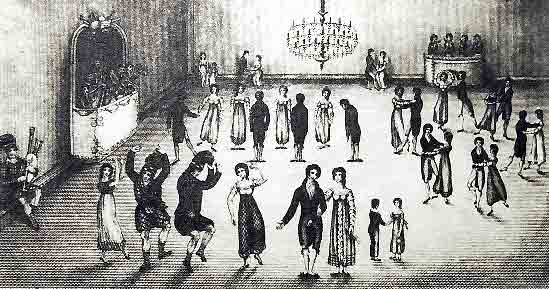|
The Henderson Collection
A Companion to the Ball Room - Thomas Wilson 1816 (3rd edition).

From "A Companion the the Ballroom" 3rd
Edition, engraved by J. Shury
"A Choice Collection of the most Original and Admired Country
Dances, Reels, Hornpipes and Quadrilles with the appropriate Figures
to Each. Containing upwards of Three Hundred Celebrated Scotch,
English and Irish, Country Dances, Reels and Hornpipes" by
Thomas Wilson, Dancing Master from the King's Theatre Opera House,
London.
The following extract is taken from Wilson's lengthy dissertation:
Ball Room Musicians
"The Author has availed himself of this opportunity of saying
something respecting Ball Room Musicians, on the opinion in which
they are held, and their general treatment by the public. That they
are a useful class of persons will not be doubted; for whatever
opinion there has been, there is no dancing without them for the
Music must always guide the dancer. From the number of Public Balls
and Assemblies at which the author has been present he has good
and frequent opportunities of observing the contemptuous manner
in which Musicians are in general treated by their Employers and
by the Company. They are frequently treated worse than servants
and never, or seldom, spoken to, but in an imperious haughty manner,
generally addressing them as fiddlers and plying them with liquor
in order to make them drunk, being with those persons a common opinion
that nothing is so amusing as a drunken fiddler.
That these persons should occasionally drink is no wonder, from
the dust arising from the room and great exertions in playing long
dances; but more should not be forced on them than is needful.
Another thing that requires remark is that musicians are seldom
paid for their playing without their employers complaining of the
high price of their labour; yet these employers never think that
the musicians cannot find employment for more than five or six months
of the year and that generally in the winter season, when the weather
is bad, and their employment being principally at night, from leaving
warm rooms and being exposed afterwards to the bad effects of night
air, and consequently severe colds, together with want of rest,
in a few years their constitutions are destroyed or ruined and they
are rendered totally unfit for business.
It is true, that there may be many found amongst them, whose talent
will not entitle them to the name of musicians; yet, notwithstanding
the majority are men of talent, men of the greatest respectability
both in manners and appearance."
The Mason's Apron, a tune as popular today as it was in the 19th
century. From Wilson's 3rd Edition, 1816 
|

